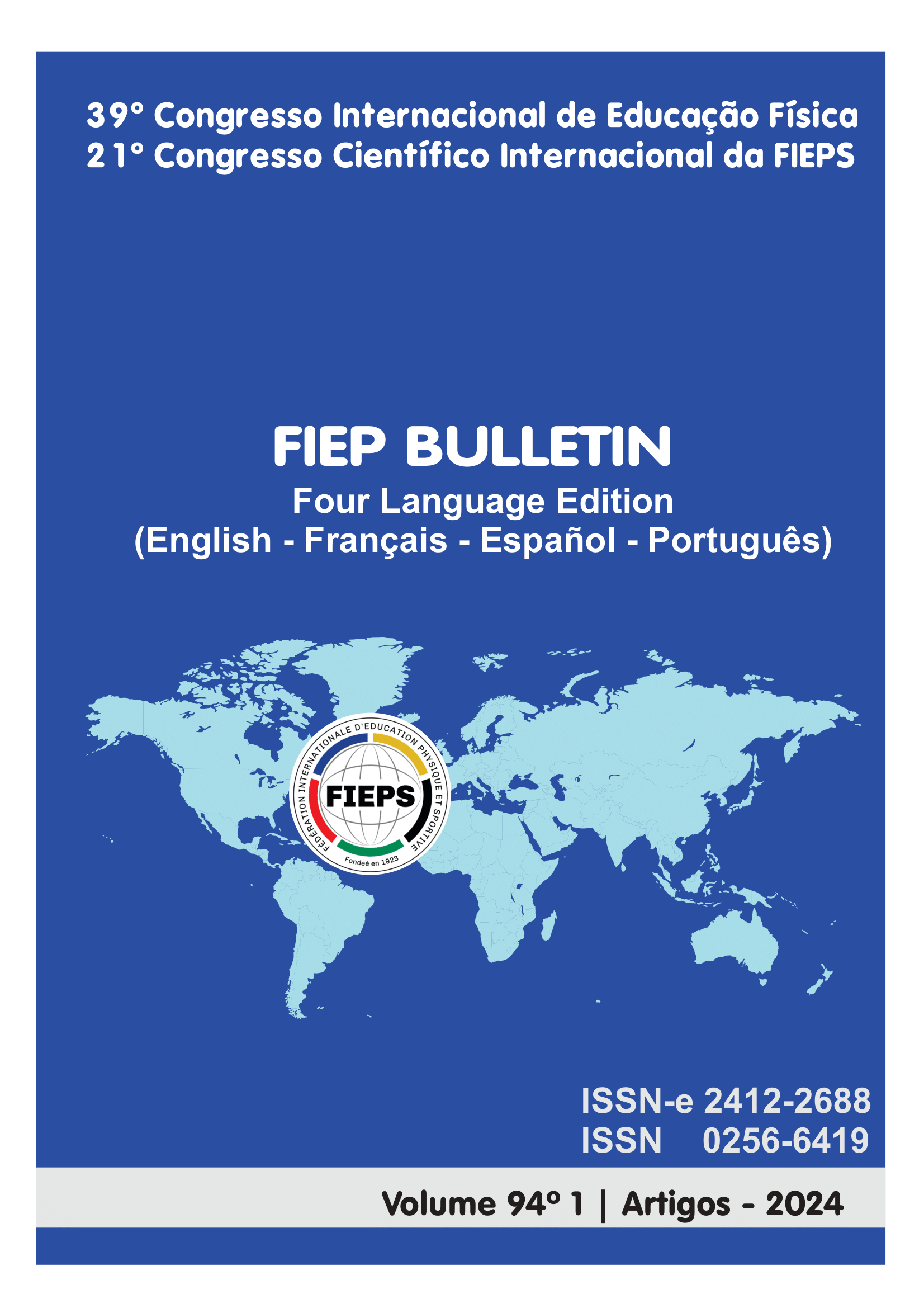JUDO AT SCHOOL: PERSPECTIVES FROM PHYSICAL EDUCATION GRADUATES
DOI:
https://doi.org/10.16887/fiepbulletin.v94i1.6793Keywords:
Judo, asic Education, Teacher Training, Physical EducationAbstract
Introduction: This research presents an analysis of the perspective of undergraduate students in physical education at the Federal University of Paraíba on judo as a school content. The Objective is to relate experiences of judo during teacher training, with future pedagogical attitudes to be adopted, understand expectations and identify difficulties regarding this fight in the school environment. Methods: the study is qualitative in nature, with a descriptive-explanatory typology, with a transversal temporal cut. The data collection instrument used was semi-structured interviews, which were based on discourse analysis. 30 physical education students enrolled at UFPB, who had already studied judo, participated in the investigation. Results: the reports mentioned factors such as attention, concentration, cooperation, respect and self-defense arising from the practice of the sport. Furthermore, when asking about expectations, contexts were identified that could result in this subject not being approached, such as the (pre)concept of violence, class avoidance justified by the use of electronic devices and social imperatives such as the conception of gender, which is still present today. Conclusion: this research becomes relevant when referring to the importance of judo in the school environment, also contributing to the main aspects of the study that report the students' perspectives in the speeches obtained, analyzed and exposed, becoming an instrument for derivative research and analysis . It is expected to contribute to reflections on didactic-pedagogical means during teacher training, enabling the future teacher to have confidence and mastery of judo teaching so that this sport is present in physical education classes.
Downloads
References
BRANDÃO, P. P. S. Lutas no currículo da educação física no ensino fundamental sob o olhar da diversidade cultural: experiências na Escola de Aplicação da Universidade Federal do Pará. (Dissertação de mestrado em educação física) Universidade Federal do Pará. Belém, 2018.
BRASIL. Base Nacional Comum Curricular (BNCC). Educação é a Base. Brasília, MEC/CONSED/UNDIME, 2017
__________. Parâmetros Curriculares Nacionais: Educação Física. Brasília, Secretaria de Educação Fundamental, MEC/SEF, 1998.
__________. Senado Federal. Lei de Diretrizes e Bases da Educação Nacional: nº 9394/96. Brasília: 1996.
GONDIM, D. F Dojô: espaço de educação. (Dissertação de mestrado em Educação Física), Universidade Federal de Pernambuco, Recife, 2017.
ORTEGA, M.E.S. Jogos de oposição: uma alternativa lúdica para inserção das lutas na escola. Trabalho de Conclusão de Curso - TCC (Graduação em Educação Física) - UFRN, 2022.
PARLEBAS, Pierre. Activités physiques et éducation motrice, Paris, EPS, 1990
RIBEIRO, G. C. As lutas no contexto da educação física escolar: ênfase em jogos de lutas. Ciência é minha praia, Paraná, v.6, n. 1, p. 45-49, 2019.
SANTOS M.A.R.; BRANDÃO P.P.S. Produção do conhecimento em lutas no currículo da educação física escolar. Rev. Movimento, v 20, 2019. DOI: https://doi.org/10.22456/1982-8918.78143
UCHIDA, R. Uruwashi: o espirito do judô. São Paulo: Évora, 2013.
Downloads
Published
Issue
Section
License
Autores que publicam nesta revista concordam com os seguintes termos:- Autores mantém os direitos autorais e concedem à revista o direito de primeira publicação, com o trabalho simultaneamente licenciado sob a Licença Creative Commons Attribution que permite o compartilhamento do trabalho com reconhecimento da autoria e publicação inicial nesta revista.
- Autores têm autorização para assumir contratos adicionais separadamente, para distribuição não-exclusiva da versão do trabalho publicada nesta revista (ex.: publicar em repositório institucional ou como capítulo de livro), com reconhecimento de autoria e publicação inicial nesta revista.
- Autores têm permissão e são estimulados a publicar e distribuir seu trabalho online (ex.: em repositórios institucionais ou na sua página pessoal) a qualquer ponto antes ou durante o processo editorial, já que isso pode gerar alterações produtivas, bem como aumentar o impacto e a citação do trabalho publicado (Veja O Efeito do Acesso Livre).










